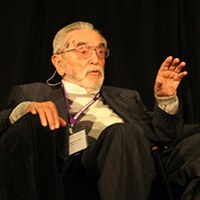EP09 Keynote 05 – Reflections on Family Therapy – Salvador Minuchin, MD
- Average Rating:
- Not yet rated
- Topic Areas:
- Family Therapy | Keynotes | Psychotherapy | History of Psychotherapy
- Categories:
- Evolution of Psychotherapy | Evolution of Psychotherapy 2009 | Pioneers in Couples and Family Therapy
- Faculty:
- Salvador Minuchin, MD
- Course Levels:
- Master Degree or Higher in Health-Related Field
- Duration:
- 1:12
- Format:
- Audio and Video
- Original Program Date:
- Dec 12, 2009
- License:
- Never Expires.
Description
Description: Minuchin reflects on the evolution of family therapy, contrasting its growth in Europe with its decline in the U.S. He shares an assessment model rooted in his early work at Willowbrook and shaped by cultural diversity. Drawing on influences from feminist, narrative, and systemic approaches, he advocates for family members as active agents of healing and critiques the overuse of medication in child treatment.
Syllabus Description: After a brief description of Family Therapy on the 1960s, and an equally brief description of where it is today, we will make a comparison of the success of family therapy in Europe and the shrinkage in the U.S. A new model of family assessment in four easy steps will be described.
Educational Objectives:
- To compare and contrast the different ways of doing Family Therapy.
- To describe the four steps of family assessment.
*Sessions may be edited for content and to preserve confidentiality*
Credits
Faculty

Salvador Minuchin, MD Related Seminars and Products
Salvador Minuchin, MD, developed Structural Family Therapy, which addresses problems within a family by charting the relationships between family members, or between subsets of family. He was Director of the Philadelphia Child Guidance Clinic. Although it was minimally staffed when he began, under his tutelage the Clinic grew to become one of the most modeled and respected child guidance facilities in the world. In 1981, Minuchin began his own family therapy center in New York. After his retirement in 1996, the center was renamed the Minuchin Center. Dr. Minuchin is the author of many notable books, including many classics. His latest is Mastering Family Therapy: Journeys of Growth and Transformation. In 2007, a survey of 2,600 practitioners named Minuchin as one of the ten most influential therapists of the past quarter-century.


